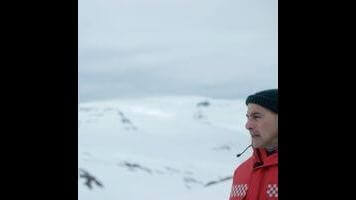Fortitude: “Episode 10”

As a driver, there are few things more terrifying than black ice. For the unfamiliar, black ice is a phenomenon that happens in road in cold weather, where mist or rain combine with low temperatures and form a thin layer of nearly transparent ice on roadways, making it indistinguishable from other merely wet sections of the road. Generally, by the time you realize you’ve hit a patch, you’re already skidding, the situation rapidly escalates into something you can’t control. This is when the panic sets in. You may try to slam on the breaks, to stop what’s already been set into motion, but that will only exacerbate your skid. You may sense your mistake and furiously try to overcorrect, attempting to erase your errors and right the past through brute force. But the only way to navigate black ice once you’ve come upon it, is to steer into the skid, ease off the gas, and stay calm.
Black ice isn’t a practical concern in Fortitude, not really. That’s probably not surprising in a community that depends primarily on snowmobiles for transportation. But all the same, the concept surrounding black ice plagues the town all the same, and has from the start. Time and again, characters get spun out by events they could not see coming, situations they then exacerbate through overcorrection.
No character better captures this mentality than Henry, a development that’s simultaneously predictable while also being shocking in its breadth. Henry has always been a bit plagued by extremes, as evidenced by the fact that he begins the episode camped out on the side of a glacier, listening to classical music and waiting for the sweet release of death. He’s not been the same since shooting Billy Pettigrew in the head but, more significantly, since making the anonymous phone call bringing DCI Morton to town and casting aspersions on the governor and sheriff. We’ve seen Henry punishing himself for this behavior from the start and never completely understood why this apparent betrayal cost him so much peace of mind, but “Episode 10” clears all of that fogginess up in short order.
But not before Henry’s latest act of extreme overcorrection. Morton finds Henry, confronts him with the truth about his killing of Billy Pettigrew but, more importantly, with Henry’s photographic evidence of Dan handcuffing of Pettigrew to the beach. It’s a tense moment and one that seems primed to be the turning point for the final episodes, though perhaps not in the way originally anticipated. Because in the middle of Morton’s accusations, Henry, still prone in his sleeping bag, shoots Morton in the gut, before yelling at him that interrupting him in the process of his death was unacceptable, “Look at what you made me do!”
What happens between the two for the rest of the episode feels a bit like a slow-motion car crash by way of a Samuel Beckett play, in which two men wait for death, one more willingly than the other. It’s during this time that we find out that Henry is actually Sheriff Andersson’s father, though Dan has no idea, and that much of Henry’s life has been consumed by the guilt of leaving both Dan and his mother, the woman Henry loved, in the grips of an angry and abusive man while Henry skipped town and traveled the world. Henry, throughout the season, has been grappling with the idea that he abandoned his son yet again, turning him over to authorities, again failing to protect him like a father should.
Throughout Henry’s Gethsemane, Morton is rapidly cycling through the stages of grief, while slowly and painfully bleeding out of his gunshot wound.
“I can survive. That’s survivable.”
“I don’t want to get your hopes up.”
“I don’t deserve this.”
